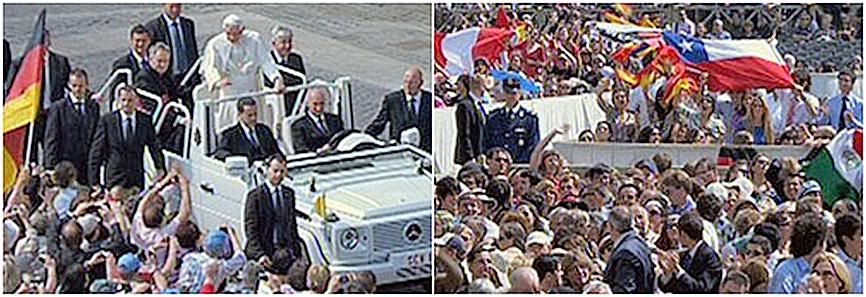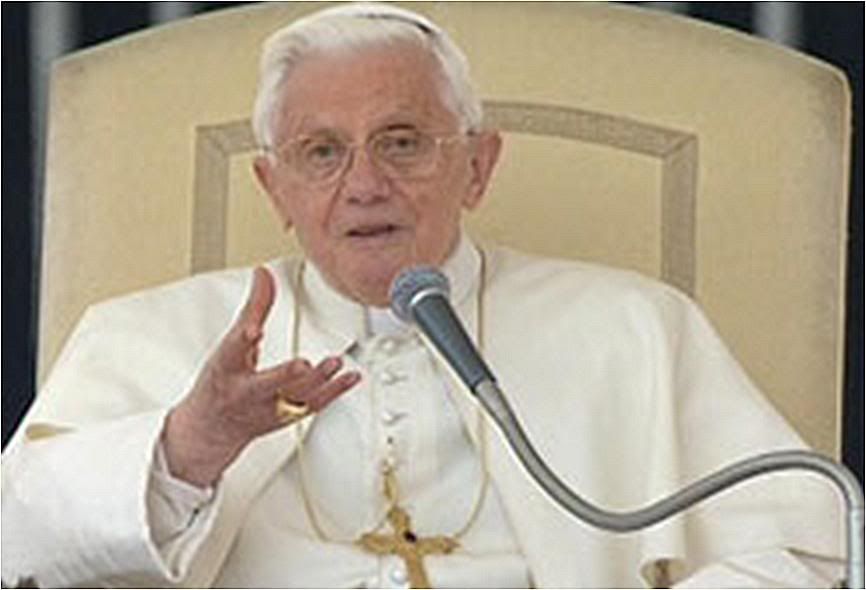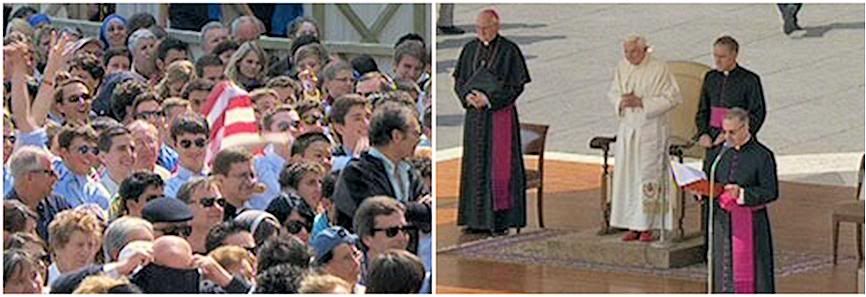| | | OFFLINE | | Post: 26.525
Post: 9.012 | Registrato il: 28/08/2005
Registrato il: 20/01/2009 | Administratore | Utente Master | |
|

 As I was unable to post anything yesterday, I have to make up for both Maundy Thursday and Good Friday... Thank God I am no longer under my self-imposed pressure to keep up with the Church news 24/7 in the past eight years...
March 28, MAUNDY THURSDAY
As I was unable to post anything yesterday, I have to make up for both Maundy Thursday and Good Friday... Thank God I am no longer under my self-imposed pressure to keep up with the Church news 24/7 in the past eight years...
March 28, MAUNDY THURSDAY

 WITH THE POPE ON MAUNDY THURSDAY
WITH THE POPE ON MAUNDY THURSDAY
March 28, 2013
Pope Francis celebrated the Chrismal Mass at St. Peter's Basilica, and in the afternoon, celebrated the Mass
of the Lord's Supper at Rome's juvenile detention center in Casal del Marmo.
A gratifying sidelight of Pope Francis's day yesterday was that once again, he placed a telephone call to Benedict XVI in Castel Gandolfo. As reported in today's issue of L'Osservatore Romano:
Pope's third telephone call
to Benedict XVI

March 28, 2013
Pope Francis telephoned Benedict XVI after the celebration of the Chrismal Mass at St. Peter's Basilica. On the day when all priests repeat their ordination vows, the Pope wished to express, during a long and significant conversation, his sense of fraternal communion with his predecessor.
[It was the Pope's third telephone call to Benedict XVI, in addition to the visit and lunch they shared on Saturday, March 23. God bless Pope Francis, and God bless Benedict XVI.]
 As I had meant to do for this Holy Week, I am posting Benedict XVI's April 2011 catechesis on the Paschal Triduum as an excellent preparation for the culminating events of Holy Week, and is still good for today till Sunday... His catechesis on Wednesday of Holy Week in 2012 was about his apostolic visit to Mexico and Cuba which ended on March 28.
As I had meant to do for this Holy Week, I am posting Benedict XVI's April 2011 catechesis on the Paschal Triduum as an excellent preparation for the culminating events of Holy Week, and is still good for today till Sunday... His catechesis on Wednesday of Holy Week in 2012 was about his apostolic visit to Mexico and Cuba which ended on March 28.
 GENERAL AUDIENCE
GENERAL AUDIENCE
The Paschal Triduum
Benedict XVI explains the significance
of the Holy Week liturgies
April 20, 2011

Pope Benedict XVI Wednesday dedicated his last catechesis before Easter to the Holy Week Triduum.
Today, he said, there is "a certain callousness of the soul towards the power of evil, an insensitivity to all the evil in the world: we do not want to be disturbed by these things, we want to forget, perhaps, we think, it is not important. It is not only insensitivity to evil, but also insensitivity to God”.

Here is the full catechesis:
Dear brothers and sisters,
We have come to the heart of Holy Week and the end of our Lenten journey. Tomorrow, we enter the Paschal Triduum, the three holy days during which the Church commemorates the Passion, death and resurrection of Jesus.
The Son of God, after having become man in obedience to the Father, becoming like us in everything except sin (cfr Heb 4.15),had accepted to fulfill God's will to the very end, to face his Passion and the Cross for our sake, in order to have us take part in his Resurrection, so that in him and through him, we may be able to live for always, comforted and at peace.
And so, I exhort you to welcome this mystery of salvation, to take part intensely in the Paschal Triduum, fulcrum of the entire liturgical year and a time of special grace for every Christian.
I invite you to meditation and prayer these days in order to draw more profoundly from this spring of grace.
To this end, in view of the imminent celebrations, every Christian is also invited to the Sacrament of Reconciliation, a moment of special adherence to the death and resurrection of Christ, in order to take part most fruitfully in Holy Easter.
Maundy Thursday is the day that recalls the institution of the Eucharist and of the priestly ministry. In the morning, each diocesan community, assembled in the cathedral around their bishop, celebrates the Chrismal Mass, in which tho sacred Chrism, the oil for catechumens and the oil for the sick, are blessed.
Starting with the Paschal Triduum and for the entire liturgical year, these oils will be used in the sacraments of Baptism, Confirmation, priestly and episcopal Ordinations, and Unction for the sick.
This shows how salvation, transmitted by the sacramental signs, flow directly from the Paschal Mystery of Christ. In fact, we are redeemed by his death and resurrection, and through the sacraments, we can draw from that salvific spring itself.
Also taking place during the Chrismal Mass is the renewal of priestly vows. Throughout the world, every priest renews the commitments he took on the day of his Ordination, in order to be totally consecrated to Christ in the exercise of his sacred ministry in the service of his brothers. Let us accompany our priests with our prayers.
The afternoon of Maundy Thursday is when the Paschal Triduum properly begins, with the commemoration of the Last Supper, at which Jesus instituted the Memorial to his resurrection, while fulfilling the Jewish Paschal rite.
According to tradition, each Jewish family, together at table on the feast of the Passover, eats roast lamb to recall the liberation of the Israelites from slavery in Egypt. And so, in the Cenacle, aware of his imminent death, Jesus, the true Paschal Lamb, offered himself for our salvation (cfr Cor 5,7).
Pronouncing a blessing over the bread and wine, he anticipated the sacrifice on the Cross and manifested the intention of perpetuating his presence among his disciples: Under the species of bread and wine, He renders himself truly present in the Body he was to give and the Blood that he would shed.
During the Last Supper, the Apostles are constituted ministers of this sacrament of salvation. Jesus washes their feet (cfr Jn 13,1-24), asking them to love each other as he has loved them, in giving his life for them. In repeating this gesture in the liturgy, we too are called to testify factually to the love of our Redeemer.
Finally, Maundy Thursday closes with Eucharistic Adoration, to recall the agony of the Lord in the Garden of Gethsemane. After leaving the Cenacle, he retired to pray, by himself, to his Father.
At that moment of profound communion, the Gospels recount that Jesus experienced great anguish, a suffering so extreme it made him sweat blood (cfr Mt 26,38). Knowing about his imminent death on the Cross, he felt great anguish at the closeness of death.
In this situation, another element of great importance to the Church is manifested. Jesus tells his disciples: "Stay here and watch". This appeal for vigilance concerns precisely this time of anguish, of menace, in which the traitor would arrive, also concerns the entire history of the Church.
It is a permanent message for all time, because the somnolence of Christ's disciples was not just a problem at that moment, but a problem for all history. The question is what does this somnolence consist of, and what constitutes the vigilance that the Lord asks us to have.
I would say that his disciples' somnolence throughout history is a certain insensibility of the soul to the power of evil, an insensibility to all the evil in the world. We do not want to be bothered by these things - we want to forget about them, and thinking that they cannot be so bad, we forget.
But it is not just our insensibility to evil. We must also be vigilant about doing good, to fight evil with the forces of good.
It is an insensibility to God - this is our true somnolence: the insensibility to the presence of God which makes us insensible to evil as well.
We do not feel God - it would disturb us to do so - and so, we likewise do not feel the power of evil, and we remain along the path most convenient to us.
The nocturnal adoration on Maundy Thursday, keeping watch with the Lord, must be the moment when we reflect on the somnolence of the disciples, of the defenders of Jesus, of the Apostles, of we ourselves, who do not see and do not want to see the power of evil. We do not wish to enter into the Lord's passion for goodness, for the presence of God in the world, for love of God and our neighbor.
Then the Lord begins to pray. The three apostles - Peter, James and John - fall asleep, but once in a while they wake up to hear the refrain of Jesus's prayer: "Not my will but yours be done".
What is this 'my will' and 'your will' that the Lord refers to? His will was "Let me not die", that he be spared the chalice of suffering - it is human will, human nature, and Christ, with the full consciousness of his being, feels life, feels the abyss of death, the terror of the void, the threat of suffering.
He, more than us with our natural aversion to death, this natural fear of death, far more than us he feels the abyss of evil. He feels, with his death, all the sufferings of mankind, He feels that all this is the chalice he has to drink from, he must make himself drink it, accepting the evils of the world, everything terrible, like the aversion to God, and all sin.
Thus we can understand how Jesus, with his human spirit, would have been terrified in the face of all these realities which he perceives in all of their cruelty. "My will would be not to drink this cup, but my will is subordinate to your will", the will of God, the will of his Father, which is also the true will of the Son.
And so, in this prayer, Jesus transforms his natural aversion against this chalice, against his mission of dying for us - he transforms his natural will into the will of God, into a Yes to God's will.
Man, as he is, is tempted to oppose the will of God, to try and follow his own will instead, to feel himself free only if he is autonomous from God - he opposes his own autonomy to the heteronomy of following the will of God.
And that is the entire tragedy of mankind. Because in truth, this autonomy is wrong, and entering into God's will is not opposing oneself, it is not a slavery that violates my will, but it is to enter into truth and love, into what is good.
Jesus draws our will upward, this will which opposes God's will, which seeks autonomy - he draws it upward towards God's will. This is the drama of our redemption: that Jesus draws our will upwards, all our aversion to God's will, as our aversion to death and sin, and unites these with the will of the Father: "Not my will but yours be done". In this transformation of our No into Yes, in this assimilation of our will into God's will, Jesus transforms mankind and he redeems us.
He invites us to enter into this movement - to leave our No and enter the Yes of the Son. I have my own will, but the Father's will is final, because it is truth and love.
There is one other element of Jesus's prayer in Gethsemane that I consider important. The three witnesses observed - as we are told in Sacred Scripture - that the Lord addressed his Father with the Hebrew and Aramaic word 'Abba', which means 'father'.
So here we look into the intimacy of Jesus, how he speaks as family, how he speaks as the Son with the Father. We see the trinitarian mystery: the Son who speaks to the Father and who redeems mankind.
One more observation: The Letter to the Hebrews gives us a profound interpretation of this prayer by the Lord, of the drama in Gethsemane. It says that the tears of Jesus, his prayer, his cries of anguish, all this was not simply a concession to the weakness of the flesh, as one might say.
But in this way he was fulfilling the function of the Supreme High priest, he who should carry the human being with all his problems and sufferings, towards the altitude of God.
The Letter to the Hebrews says: With all these cries and tears, suffering and prayer, the Lord presented our reality to God
(cfr Heb 5,7ff). It uses the Greek word 'prosferein' which is a technical term for what the Supreme High priest must do, in order to offer something, to lift his hands high.
Precisely in this drama in Gethsemane, where it would seem that the power of God was no longer present, Jesus carried out the function of the Supreme High Priest. It also tells us that this act of obedience - this transformation of the natural human will to God's will = is perfected by the priest. And here too, the technical word for ordaining priests is used. Thus Jesus truly became the Supreme High Priest of mankind, opening heaven to us and the door to the Resurrection.
If we reflect on the drama of Gethsemane, we can also see the great contrast between Jesus in his anguish and suffering, and the great philosopher Socrates who remained peaceful, undisturbed by the prospect of his death. This would seem to be the ideal.
We can admire this philosopher, but the mission of Jesus was something else. His mission was not such total indifference and freedom. His mission was to carry in him all of our sufferings, the entire human drama. And that is why his humiliation in Gethsemane is essential for the mission of God-man.
He bears in himself our sufferings, our shortcomings, and transforms them according to the will of God. In this way, he opens the gates of heaven, he opens heaven to us: the tent of the Most Holy which until then, man had closed against God - it had finally opened because of his suffering and obedience.
So these are some observations for Maundy Thursday, for our celebration of the night of Maundy Thursday.
On Good Friday, we commemorate the Passion and death of the Lord. We adore Christ crucified, we take part in his sufferings through penance and fasting.
Turning our eyes 'towards him whom they had pierced' (cfr Jn 19,37), we can draw grace from his crushed heart from which flowed blood and water as from a spring. From that heart from which flows the love of God for every man, we receive his Spirit.
And so on Good Friday, we too must accompany Jesus as he climbs Calvary. Let us allow ourselves to be led by him towards the Cross, and let us receive the offering of his immolated body.
Finally, on the night of Holy Saturday, we celebrate the solemn Easter vigil, in which the resurrection of Christ is proclaimed to us, hid definitive victory over death which calls us to be new men in him.
Participating in this Easter vigil, the central night in the whole liturgical year, we also remember our own Baptism, in which we too were buried with Christ, in order to be able to resurrect with him and take part in the heavenly banquet (cfr Ap 19,7-9).
Dear friends, we have tried to understand the state of mind in which Jesus experienced the moment of his extreme testing, in order to grasp what oriented his actions. The criterion that guided each choice Jesus made during his whole life was his firm desire to love the Father, to be one with the Father, and to be faithful to him.
This choice to correspond to the Father's love impelled him to embrace, in every single circumstance, the plan of the Father, to carry out the design of love entrusted to him to recapitulate everything in him, in order to lead back everything to him.
In celebrating the Holy Triduum, let us dispose ourselves to welcome into our lives the will of God, knowing that in his will, even if it appears hard, and against our own intentions, is our true good, the way of life.
May the Virgin Mary guide us in this itinerary, and obtain for us from her divine Son the grace of being able to give our life for the love of Jesus in the service of our brothers. Thank you.


[Modificato da TERESA BENEDETTA 29/03/2013 23:40] |